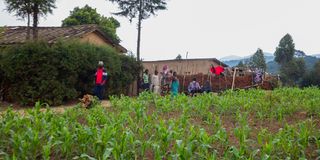Researchers develop new drought tolerant maize variety

The new variety can withstand drought stress and yield more than current varieties.
What you need to know:
- Over the course of five consecutive rain seasons between 2021 and 2023, Kenya experienced a severe drought in 30 out of 47 counties, leading to food insecurity and agricultural failure.
- Farmers experienced a significant loss of income.
A group of Kenyan scientists have created a new type of maize dubbed ‘CanSen 001’ that is resistant to the adverse effects of climate change. It is specifically tailored for areas with low rainfall. Lead researcher in the project, Dr Sylvester Anami, explains that the new variety can withstand drought stress and yield more than current varieties.
“In the unforeseen future where drought conditions are becoming more frequent and severe, the innovation is a progressive effort by local scientists to have climate resilient crop management systems in place,” explains Dr Anami. “The innovation offers a glimmer of hope to thousands of farmers in low rainfall areas, especially those depending on small-scale maize production for family food security.
The genetically engineered maize is enough proof that Kenyan crop breeders have what it takes to develop genetically engineered crops locally that meet international standards,” says the plant molecular biologist and bio-technologist.
This variety requires five months to reach maturity and when exposed to drought conditions, it can yield up to 10 bags per acreage. This is higher than other varieties that have experienced complete crop loss under similar weather conditions. This breakthrough innovation is currently in the crop management model farm stage and is awaiting various field trials.
It comes amid the ongoing debate on climate change and following massive food shortage in Kenya, particularly with maize, which is a staple crop. The shortage was due to prolonged drought caused by changes in weather patterns.
Over the course of five consecutive rain seasons between 2021 and 2023, Kenya experienced a severe drought in 30 out of 47 counties, leading to food insecurity and agricultural failure. Farmers experienced a significant loss of income. The project collaborates with Jomo Kenyatta University of Agriculture and Technology as the lead researcher, Kenyatta University and the Kenya Agriculture Livestock Research Organisation.
Drought stress tolerance in maize is achieved by subjecting it to broad stress tolerance conditions, in this case, engineering the maize to enable it to have high energy use efficiency and increased balance between energy production and utilisation (a process called homeostasis).
Dr Anami says in developing the variety, scientists applied RNAi and artificial microRNA, methods referred scientifically as ‘silencing strategies’ that allow the ‘isolation’ and ‘transfer’ of genes of the same crop species for the sole purpose of crop variety improvement.
Dr Hannighton Odame, executive director, the Centre for African Bio-Entrepreneurship, argues that Kenya needs to review seed approval policies, which sometimes take up to 10 years before a new variety is released in the market, compared to India, whose standard period is three years. “With rapidly changing weather patterns due to climate change, the lengthy approval process will compromise food security. By the time these seeds are approved and adopted for commercial production, the weather patterns will have changed, rendering the utilisation of a seed variety developed using many resources null and void.”
Adequate and timely funding is critical in enabling Kenyan scientists to employ modern breeding technologies to generate crop varieties that can offset climate change impacts, ultimately enhancing Kenyan resilience and overall well-being in the case of another drought.
To have seed sufficiency at the farmers’ convenience, Dr Kayode Sanni, director, Alliance for Hybrid Rice in Africa, urges governments in the region to consider arid and semi-arid areas for seed breeding and irrigation technology instead of relying on “traditional zoned breeding areas” where land is diminishing because of population increase and changing farmer preference.
[email protected]




